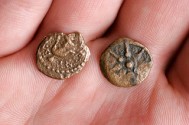Took a turn on the bLOGOS rotation at the Ekklesia Project website:
Ruth 3:1-5, 4:13-17 (RCL); I Kings 17:10-16 (LM)
Psalm 127 or 42 (RCL); Psalm 146:7-10 (LM)
Hebrews 9:24-38Mark 12:38-44
For they have all contributed from their surplus wealth, but she, from her poverty, has contributed all she had, her whole livelihood.
Mark 12:44
By the time we get to the familiar text in this week’s Gospel reading—sometimes referred to as the story of the widow’s mite—Jesus has made his so-called triumphal entry into Jerusalem. More street theatre and political satire than victory parade, the festivities end with Jesus casing the temple late of an evening. He returns the next day and turns over a few tables, infuriating the religious authorities and confounding everyone else. He enters the temple a third time on the third day (a detail not extraneous to Mark’s purposes, we might suppose), and offers an accusatory parable. Pharisees and Herodians are dispatched to trap him; they find themselves amazed instead. He bluntly tells some Sadducees: “you are wrong . . . you are quite wrong.” Third up are the scribes, for whom Jesus reserves his most caustic criticism:
Beware of the scribes, who like to go around in long robes
and accept greetings in the marketplaces,
seats of honor in synagogues,
and places of honor at banquets.
They devour the houses of widows and, as a pretext
recite lengthy prayers.
They will receive a very severe condemnation. (38-40)
Jesus then takes a seat “facing” (kateanti) the treasury. This detail, too, seems deliberate on Mark’s part: a short while and a few verses later Jesus will “face”—the same word in Greek—the temple mount as he foretells its imminent destruction (13:3).
From his choice seat, Jesus carefully “scrutinizes” (etheōrei) the scene, observing “how the crowd put money in the treasury,” and noting that “many rich people put in large sums” (41).
Just the day before he had directly attacked the temple establishment so we might assume he’s still seething a bit. Not because a sacred place had been profaned by commerce—the temple was an economic institution as well as a religious one. Rather, Jesus is scandalized by the exploitation of the poor in their attempts to participate in Israel’s cultic life.
But his anger at what he sees in the temple treasury has a sharper focus. He has just depicted the scribes—the temple lawyers—as not only religious hypocrites but also as abusers of their fiduciary power: “they devour the houses of widows.” (40)
To read the rest click here.

Leave a comment